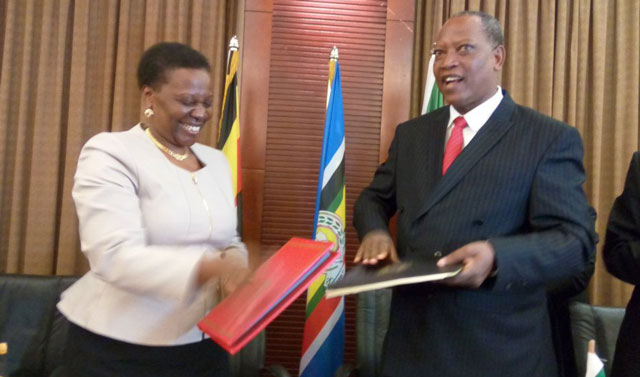
Kampala, Uganda | THE INDEPENDENT | Uganda and Tanzania have agreed to complete and sign a Host Government Agreement for the East Africa crude oil pipeline by end of June this year.
The new deadline comes after week-long negotiations between Ministers from Tanzania and Uganda.
The protracted negotiations at Kampala Serena Hotel ended on Friday with each of the sides pushing to ensure that they fully benefit from the pipeline whose construction will cost over $3.5 billion.
Sources revealed there was no conclusion on talks on revenue sharing, taxation especially corporate income tax and local content in terms of jobs during the construction of the over 1400 kilometre pipeline from Hoima in Uganda to Tanga in Tanzania.
The ministers and few technocrats from both sides would occasionally break into caucuses before they would agree on sticky issues.
On the Ugandan side were Energy Minister, Irene Muloni, Lands Minister, Betty Amongi, Deputy Attorney General, Mwesigwa Rukutana and Energy Permanent Secretary, Robert Kasande.
Finance Minister, Matia Kasaijja had to be called at some moment when the two sides seemed not to agree on financing, revenue sharing and taxation.
Kasaijja told journalists that there were points of disagreement between the two sides but noted they will not hinder the agreement. He left after almost one hour at the meeting.
On the Tanzanian were the energy Minister, Dr. Medard Kilimani, Professor, Palamagamba Kabudi, the Minister of Constitutional and Legal Affairs from Tanzania and January Makamba from the Tanzania’s presidency among others.
Energy and Mineral Development Minister, Engineer Irene Muloni said they have since April last year produced a draft Host Government Agreement pending the endorsement of the presidents.
She says oil can only come out when the crude oil pipeline and the refinery are ready to receive oil.
Each of the governments has to sign an agreement with the pipeline company. Uganda and Tanzania had agreed to fast-track developments to have first oil by 2020 but the timeline has had to be shifted.
The idea behind the host government agreements is to position the two countries to maximize the benefits from the business of shipping or transporting crude oil to the international markets.
Tanzania’s energy Minister Dr. Medard Kilimani told journalists that there have been prolonged negotiations but reported they seem to have agreed on most of the crucial issues.
Kilimani said the negotiations that have been in place since last year have not affected preparations towards construction of the pipeline.
He said Tanzania has already identified a place where the five oil storage tanks will be constructed. Each of the tanks according to Kilimani will store half a million litres of oil.
He said the construction of the pipeline should be with 36 months after the host government agreements have been signed.
****
URN
 The Independent Uganda: You get the Truth we Pay the Price
The Independent Uganda: You get the Truth we Pay the Price


